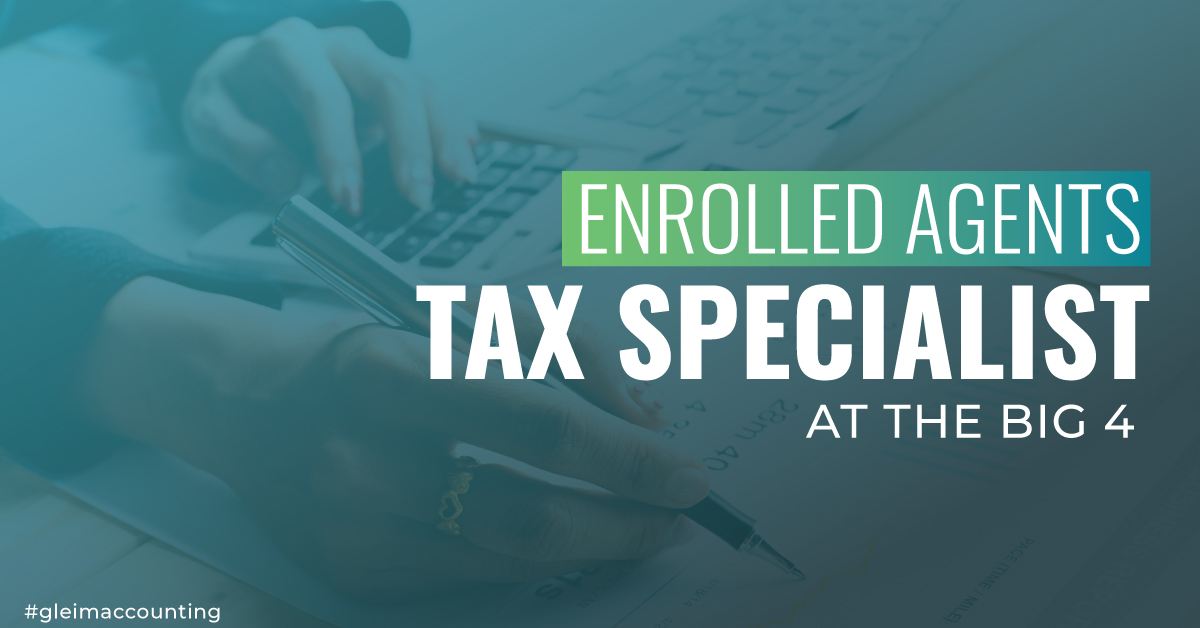Contact Us : 800.874.5346 International: +1 352.375.0772

Yes, the Big 4 accounting firms employ Enrolled Agents in multiple functions. While it may seem that Big 4 accounting firms only recognize the value of CPAs, they make use of Enrolled Agents in positions that capitalize on the strengths of the EA designation.
Enrolled Agents have a few advantages that apply to all accounting firms, and the Big 4 aren’t exempt from this. Enrolled Agents
In addition to all of these considerations, Enrolled Agents offer a significant value for accounting firms like the Big 4. The Enrolled Agent designation is cheaper and faster to obtain compared to the CPA, and it doesn’t have the steep education and experience requirements of the CPA. Plus, EAs do not have the same state jurisdictional requirements, which lowers the regulatory burden on CPA firms. In a nutshell, hiring EAs for tax-focused positions allows firms to save money.
It is true that CPAs typically earn more than Enrolled Agents, but the trade off is that the EA requires much less cost to obtain. As a result, the EA designation becomes profitable very quickly. To learn more about the differences between EAs and CPAs, click here!
The Big 4 hires Enrolled Agents for a variety of positions. PwC, Deloitte, and KPMG all have positions for Enrolled Agents:
Many of these positions still require education surpassing the requirements set by the IRS, but they don’t all require an accounting or tax degree. This makes the Enrolled Agent an excellent designation for career changers who don’t have the high-level accounting courses that are required for the CPA, but may make up for that with excellent career experience.
The short answer is—yes. Becoming an Enrolled Agent shows that you have the drive to gain a tax-specialist designation. In addition, it carries the weight of the IRS behind it, so you can be confident that it will always be valuable.
Enrolled Agents enjoy:
Higher earning potential
According to Payscale, Enrolled Agents earn approximately $48,000 dollars annually, with experienced Enrolled Agents earning $75,000. Tax preparers without a designation earn an average of $40,000 annually. For more information about an EA’s salary, click here!
More career opportunities
Because the Enrolled Agent is a national designation, being an EA allows you to represent any taxpayer before the IRS. With a larger pool of potential clients, you’ll be more valuable to all accounting firms.
Increased recognition
The EA designation is managed directly by the IRS, which means your tax expertise will be second to none. Additionally, the IRS lists EAs and people who completed AFSP on their RPO Preparer Directory. This gives people holding a designations more increased visibility, and credibility for their clients.
Whether it is expanding the number of clients you can serve, giving you a leg up in tax-related fields, or adding even more designations to your list, becoming an Enrolled Agent is an affordable designation that shows expertise and a drive to succeed.
All accounting professionals can find increased value from becoming an Enrolled Agent. The increased tax expertise offers new career opportunities, and a new designation shows your desire to continue learning and improving within the industry.
In addition, the Enrolled Agent designation is affordable and does not have a specialized education requirement. For CPAs, some state boards will even award CPE credit for passing the exams!
There are 3 parts to the Special Enrollment Exam, also known as the EA exam. Each part is $206, for a total of $618. The IRS requires a $140 fee to complete the enrollment process. At the end of the day, you’ll spend $758 on exam fees to take the EA exam, provided you pass the first time.
That is where the value of an EA Review system comes in. Working with a good review provider means you’ll save money and time by passing each part the first time you take it.
Because the EA exam focuses solely on tax, the questions are less varied but more specific to each year’s tax laws. So you’ll spend less time studying for the exam, but you’ll need a review system that will keep you up-to-date on all of the latest tax laws. For more information about the specific costs of studying and taking the EA Exam, click here!
The first step is to learn about the exam requirements and find a review system. Start the process of earning the EA today by reviewing the free Gleim Enrolled Agent exam guide. Our guide covers everything you need to know about the EA exam, including how to study for the exam, where to sit for the exam, test-day and time management tips, and how the exam is graded.